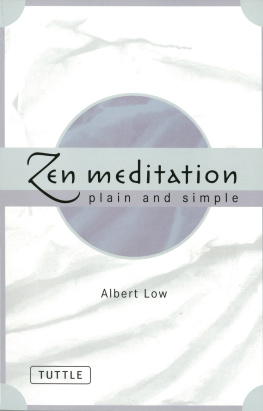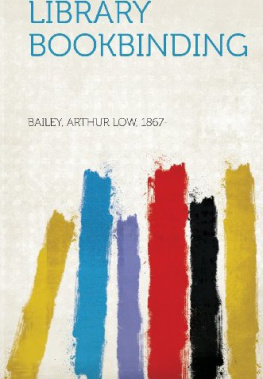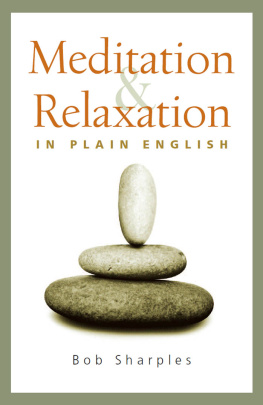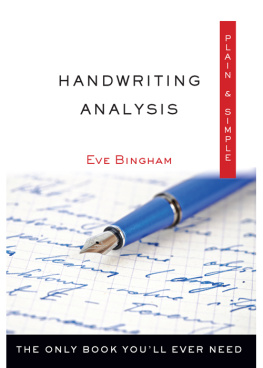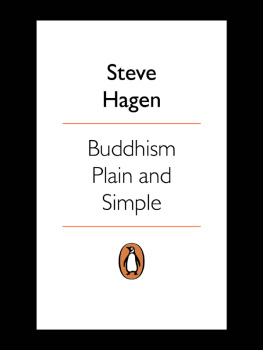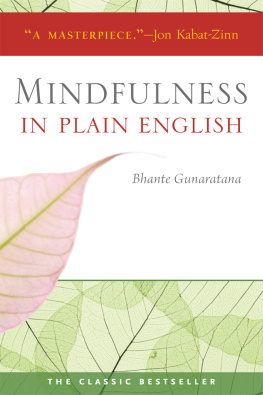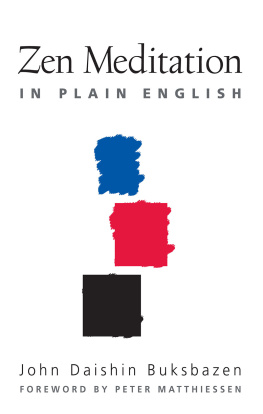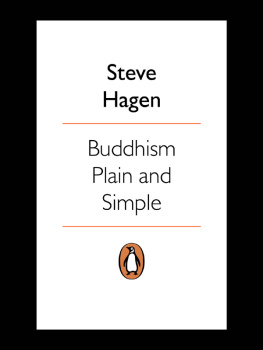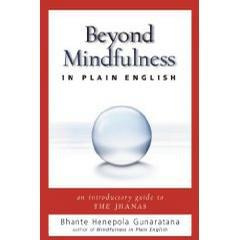Low - Zen Meditation Plain and Simple
Here you can read online Low - Zen Meditation Plain and Simple full text of the book (entire story) in english for free. Download pdf and epub, get meaning, cover and reviews about this ebook. City: New York;North Clarendon, year: 2000, publisher: Simon & Schuster, Incorporated [distributor, Tuttle Publishing, genre: Religion. Description of the work, (preface) as well as reviews are available. Best literature library LitArk.com created for fans of good reading and offers a wide selection of genres:
Romance novel
Science fiction
Adventure
Detective
Science
History
Home and family
Prose
Art
Politics
Computer
Non-fiction
Religion
Business
Children
Humor
Choose a favorite category and find really read worthwhile books. Enjoy immersion in the world of imagination, feel the emotions of the characters or learn something new for yourself, make an fascinating discovery.
Zen Meditation Plain and Simple: summary, description and annotation
We offer to read an annotation, description, summary or preface (depends on what the author of the book "Zen Meditation Plain and Simple" wrote himself). If you haven't found the necessary information about the book — write in the comments, we will try to find it.
Low: author's other books
Who wrote Zen Meditation Plain and Simple? Find out the surname, the name of the author of the book and a list of all author's works by series.
Zen Meditation Plain and Simple — read online for free the complete book (whole text) full work
Below is the text of the book, divided by pages. System saving the place of the last page read, allows you to conveniently read the book "Zen Meditation Plain and Simple" online for free, without having to search again every time where you left off. Put a bookmark, and you can go to the page where you finished reading at any time.
Font size:
Interval:
Bookmark:
Acknowledgments
I should like to acknowledge the help that I received from the Montreal Zen community, many of whom have read and commented upon the text. In particular I should like to thank Alan Travers, Tony Stern, and Ovid Avarmaa for their comments and suggestions, and to Toufik Moussa, who drew the illustrations. Grateful acknowledgment is also extended to the Rochester Zen Center for permission to quote its versions of The Prajna Paramita Hridaya Sutra, Hakuin Zenjis Chant in Praise of Zazen, the Ten-Verse Kannon Sutra, and The Four Vows.
I should also like to thank my wife, Jean, for her unfailing support.
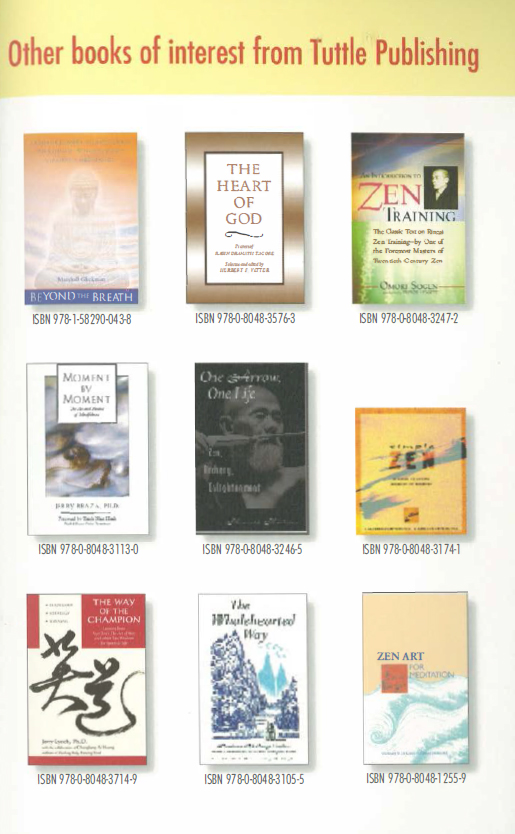
What Is Buddhism?
BUDDHA MEANS AWAKENED ONE
It might be best to start with a little history. However, as you will see, this history is not something remote and abstract; on the contrary, it has a direct bearing on the life of each of us. Zen, as most are now aware, is a sect of Buddhism, and to help lay a foundation for what is to come, we must speak about Buddhism first; then, in the next chapter, we shall speak more specifically about Zen.
The word Buddha means Awakened One. It is a Sanskrit word. Sanskrit is an ancient language that has something in common with Latin in that both are now dead languages but both have been kept in use because of religious needs. However, Sanskrit was once a living language and buddha was a living word. It meant awakening, or coming to after a faint or concussion, and thus was part of the everyday language, with no special meaning or overtones. Later it came to mean spiritual awakening, and yet later still it came to refer to a particular person, Siddhartha Gautama.
Attaining spiritual awakening, the goal of Buddhism, is as old as mankind and is a potential everyone has and always has had. To be human means to have this potential. Thus, strictly speaking, Buddhism cannot be confined to a particular culture or area. However, periodically someone attains to very deep awakening and because of this is able to breath new life into existing spiritual teachings. Such a person was Siddhartha Gautama, whom Buddhists refer to as Buddha.
BUDDHISM AND SHAKY AMUNI
Birth and early life . Siddhartha was born in Northern India. His father, according to tradition, was the chief of a tribe called the Shakyas. Later, when Siddhartha became well known as a wise man, people began to call him Shakyamuni; muni means wise man, or perhaps even saint, and Shakyamuni was therefore the wise man of the Shakya tribe.
It was the custom for astrologers to be consulted when a child was born, and astrologers predicted that Siddhartha would grow up to be either a king or a monk. A monk in those days lived a painful and arduous life. There were no monasteries but simply monks who wandered, either in small groups or alone (monk derives from the Greek monos, meaning alone), seeking spiritual purification through various ascetic practices, sleeping in the open and obtaining food wherever they could by begging or by eating wild fruits, berries, and herbs. Naturally Siddhartha's father wanted to spare his son such tribulations and so did his best to ensure that the boy, and later the man, was shielded from sights and experiences that would cause him to seek a spiritual path. He had palaces built, surrounded by beautiful gardens and filled with luxury, and he had high walls built around the palaces to keep the world out. By this means he hoped to keep his son from any deep thought or concern.
Siddhartha grew up behind these walls contented, enjoying to the full all that this kind of life had to offer. At age twenty-nine he married and had a son of his own.
Four encounters . Shortly after the birth of his son, however, Siddhartha began to grow restive, finding the luxury irksome and the comfort stifling. More and more he felt that the walls were closing him in, holding him prisoner to a way of life whose excess had itself become a source of pain and a reason for seeking escape.
One day he resolved to break out and visit a nearby town. Accompanied by his charioteer, he went off in his chariot through the palace gates and along the road to the town. He did not reach the town, however, because along the way he had the first of four encounters that were destined to change his life completely. He saw a sick man tottering along the side of the road, emaciated, bent, and feeble. So far Siddhartha had not met with sickness. It had been kept outside the walls of the palace; only the young and well had been allowed inside. Surprised, he called out to his charioteer to stop and then, pointing to the sick man they had just passed, asked about him. That, sire, said the charioteer, is a sick man. Sickness is the lot of us all. All that lives, at some time or another, falls sick. To one who had not even thought about sickness, this encounter and this pronouncement were deeply disturbing. Troubled and confused, he ordered the charioteer to turn the chariot around and return to the palace.
Safely inside the palace gates, Siddhartha resumed his former habits and ways until the old anguish of being a prisoner to pleasure reawakened, and with it the urge to escape once more. Again he made a sortie with his charioteer and for the second time he had an encounter. This time the shock was even more profound. He saw an old man. Questioning his charioteer, he received the answer: That, sire, is an old man. All that lives grows old. Siddhartha was so disturbed he again fled back to the palace. However, not long afterward another attempt was made to escape from the pain of languishing behind high walls. And once again, along the way Siddhartha met something that shattered him. It was a corpse. When he heard, All, at some time, must die, he again, in anguish, fled to the security of his palace.
Each encounter had bitten more deeply into Siddhartha's mind, and now it seemed to him he could never rest in peace again. Sickness, old age and death, the curse of life and the burden of insecurity, now haunted him. No walls could now keep out these three, no comfort or luxury banish them, no achievement nullify them.
Someone said that religion begins with the cry for help, and now Siddhartha's whole being was crying for help. He left the walled enclosure once again and had his fourth encounter, the one that profoundly and irrevocably changed his life, and in time, the lives of countless millions of others. He met a monk. When he asked about the monk he was told a monk was one who was seeking a way beyond sickness, old age, and death.
Siddhartha resolved then and there to become a monk himself, to seek this way. At night, when his wife and child, friends, and servants, were all soundly sleeping, he slipped out of the house, through the gates of the grounds and into the nearby forest. There he paused long enough to strip off his fine clothes and to cut away his long hair. Then, leaving behind all that he owned and loved, he went deep into the forest to seek answers to the questions boiling inside him, to extract a meaning from what seemed a meaningless life, to find a way out of the cul-de-sac of existence whose end was sickness, old age, and death.
The search . For six years Siddhartha struggled to find peace of mind. He visited teachers and tried all the known ways, employing all the severe and austere practices of the time. He came to live on the most meager ration of food, so little in fact that, suffering from severe malnutrition, he grew so weak his health began to deteriorate and death seemed inevitable. In this emaciated and tormented state a memory came to him of a time when, as a youth of sixteen, he had one day, sitting under a rose-apple tree, experienced a oneness that seemed to pervade all things. He had beheld an unseen unity that binds all together in one vast and boundless universe. He had felt, at that time, that he was close to truth, and now, remembering this years later at the extremity of his endurance, he resolved to find again the door that he had walked up to but not through. After taking some nourishment, he resolved to sit beneath a Bo tree and meditate in order to plumb this unity to its depths. He vowed to continue meditating even if his flesh were to dry up and his bones crumble and turn to dust, and not to stop until he had penetrated through to this very truth itself.
Font size:
Interval:
Bookmark:
Similar books «Zen Meditation Plain and Simple»
Look at similar books to Zen Meditation Plain and Simple. We have selected literature similar in name and meaning in the hope of providing readers with more options to find new, interesting, not yet read works.
Discussion, reviews of the book Zen Meditation Plain and Simple and just readers' own opinions. Leave your comments, write what you think about the work, its meaning or the main characters. Specify what exactly you liked and what you didn't like, and why you think so.

